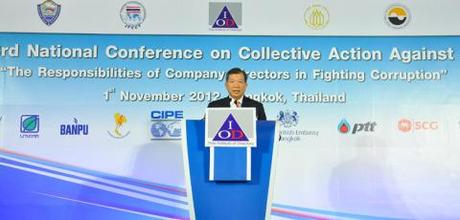
Dr. Pakdee Pothisiri, Commissioner of Thailand’s National Anti-Corruption Commission, at an IOD event in Bangkok. (Photo: CIPE)
Corruption is one of the world’s most pervasive and vexing problems, costing the global economy hundreds of billions of dollars each year and stalling economic growth in many developing countries. Though most anti-corruption efforts focus on government-driven solutions in Thailand, the private sector, with CIPE’s assistance, has taken the lead in stamping out corrupt practices.
Writing in the Bangkok Post, CIPE Program Officer John Morrell describes how this unique program took shape, and why private companies have taken such an interest in what is usually regarded as a problem for the government.
With CIPE’s support, the Thai Institute of Directors (IOD) has spearheaded a Coalition Against Corruption (CAC) which now includes most of the major domestic and international firms in Thailand. The Coalition began by offering anti-corruption and compliance training for senior executives and sharing information on strategies for combating corruption, and recently introduced a compliance mechanism which the members have enthusiastically supported.
“Companies understand that joining IOD’s coalition requires a substantial commitment of time and resources, and could involve significant organisational changes, but they are joining in droves anyway,” said CIPE Executive Director John D. Sullivan.
Why are companies so eager to participate in this initiative?
Bandid Nijathaworn, president and CEO of IOD and a former deputy governor of the Bank of Thailand, believes that “the Thai private sector is fully aware that tackling corruption is key to the sustainability of Thai businesses and the economy in the longer term. The CAC initiative offers a workable and visible vehicle for companies to directly participate and help promote integrity and a level playing field in Thai businesses.”
“The momentum is now building, and as more companies join, the momentum will be even stronger. This is the private sector’s policy advocacy by example.”
Read the rest of Morrell’s article at the Bangkok Post.

